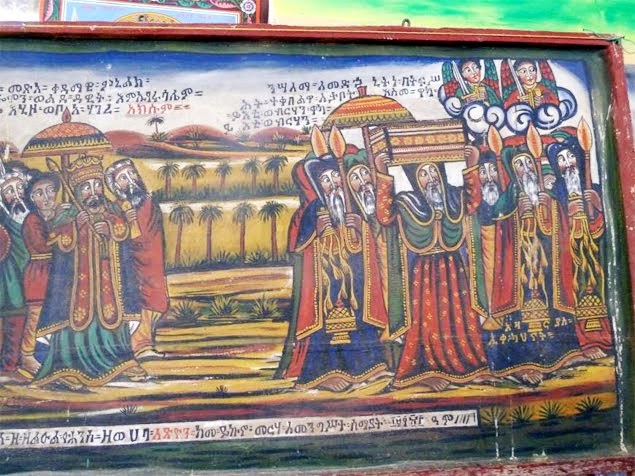Earlier this month, 21 refugees from Eritrea made international headlines when stranded at the Israeli-Egyptian border. Last month, three migrants from the east African country were stabbed at a Tel Aviv internet café. Critics say the Israeli government blacklists these refugees as infiltrators, even considering them an existential threat. Our correspondent reports on one individual who, despite the discord around him, focuses on making existence easier for his fellow Eritreans in Israel.
By Vanessa O’Brien, Tel Aviv
Kebedom Menghistu doesn’t dress like most of the refugees here. He walks around the run-down, densely populated African migrant area of south Tel Aviv looking likes he’s come fresh from a church service. As though he were an elder in the refugee community, the 34-year-old Eritrean asylum seeker receives hearty handshakes and pats on the back.
To pay for the poorly maintained apartment he shares with seven other men, Menghistu works for minimum wage as a cleaner. But every other waking minute is spent on New Century, the newspaper that he publishes for the 35,000-strong Eritrean community in Israel.
A journey he knows well
The former accountant fled Eritrea in 2008 for fear of persecution. Menghistu saw what happened to others who championed freedom of the press there. After a gruelling two-year journey through Ethiopia, Sudan, Libya and Egypt, he arrived at the Israeli border, where he was welcomed by Israeli soldiers.
The former accountant fled Eritrea in 2008 for fear of persecution. Menghistu saw what happened to others who championed freedom of the press there. After a gruelling two-year journey through Ethiopia, Sudan, Libya and Egypt, he arrived at the Israeli border, where he was welcomed by Israeli soldiers.
After 20 days at the Beersheba detention centre, he was given a one-way ticket to Tel Aviv. He spent the next three freezing winter months sleeping rough in Levinsky Park. Then, he found work and eventually a place to stay. Without a legal refugee status, and armed with his only two possessions – laptop and camera – he saved every penny for his newspaper.
In April 2011, Menghistu launched its first edition in Tigrinyan, one of Eritrea’s two main languages. The 3,000-copy print run was half-funded by Amnesty International, the rest from his own pocket.
The newspaper’s raison d'être was to inform Israeli-bound asylum seekers of the dangers they could expect and the reality of life inside the country. But attempts to have UNHCR distribute the publication in Ethiopia and Sudan were unsuccessful. Menghistu subsequently refocused its contents to focus on community-building: sharing asylum seekers’ stories, advising struggling couples and families and giving advice on the practicalities of everyday life in Israel, such as keeping a quiet Shabbat.
Keeping afloat
Lately, New Century has struggled to keep afloat. It is printed sporadically, whenever money is available; so far, there have been eight editions.
Lately, New Century has struggled to keep afloat. It is printed sporadically, whenever money is available; so far, there have been eight editions.
Speaking about her own country’s leaders, Galili says: “If I can change the mindset of 10 people, or 100 people over time and make some of the politicians feel bad, I will say that’s a great achievement. I want them to feel bad.”
For Menghistu’s newspaper, she writes a column in Hebrew that endeavours to help Israeli society understand the Eritrean asylum seekers. Her column scheduled to appear at month’s end addresses Israeli interior minister Eli Yishai’s comments about making migrants’ lives so miserable they want to leave. As most of the Eritrean community doesn’t speak Hebrew, the statement largely fell on deaf ears. According to Galili, it didn’t matter.
“They don’t care about statements, they went through hell coming here, and they’re living in hell as refugees,” she says. “I met a guy with seven bullets in his body, accumulated through his trip through the desert. So what does he care what a minister says?”
Holding on
The next edition of New Century will discuss how to hold onto one’s culture. The topic seems pertinent since there’s a high incidence of family breakdown and violence within the Eritrean community. Traditional gender roles are frequently challenged: women adopt more liberal, Western dress standards and men struggle to find work.
The next edition of New Century will discuss how to hold onto one’s culture. The topic seems pertinent since there’s a high incidence of family breakdown and violence within the Eritrean community. Traditional gender roles are frequently challenged: women adopt more liberal, Western dress standards and men struggle to find work.
“This is not our culture,” says Menghistu, referring to Israel. “We are here for a while. We will go back to our country, so don’t lose your culture, because if we are going back to our country, it may create a huge difficulty there.”
Menghistu is capable of more than just cleaning, he says. But with the constant threat of deportation, he lives for the moment. Long-term thinking is reserved for his next publication. “I hope to continue this newspaper,” he says. “I want to be a journalist. To tell them the reality as I can and as I know it.”





